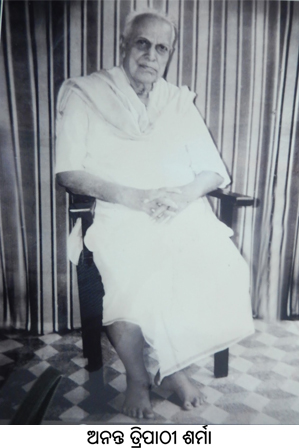Shree Ananta Tripathy Sharma
Died :- 10-Oct-1991
Place of Birth :-

Ayurvedic scholar, a nationally famed erudite in Sanskrit, a multi-linguage expert, Pandit Anant Tripathy Sharma was born on February 22, 1904 in Jagannathpur Sasan near Asika in Ganjam district. Kabiraj and astrologist Gadadhar Tripathy was his father and Mohini Devi was his mother. His grandfather was Pandit Chandrashekhar Tripathy. His maternal uncle was Upendra Mishra, a renowned college teacher in grammar.
After learning Sanskrit from an early age, Anant Tripathy Sharma received Sahitya Shiromani from Vijayanagar Sanskrit Kala Saala, MA in Sanskrit from Nagpur University, POL and Shastri in grammar from Madras University, and Ayurvedacharya from Puri. He also did his Post Graduation (Ratna) in Hindi at a later stage in life.
The audience marvelled at his eloquent and forceful speech in simple and intelligible Sanskrit. After Pandit Gopinath Nandasharma, Ananta Tripathy Sharma was professor of literature at the Paralakhemundi Raj-Mahavidyalaya and Principal of the Sanskrit College there. After retirement from the teaching profession in bitter circumstances, he did not miss a chance to teach literature, alankar and Ayurveda to the students until the end of his life. His efforts to promote and propagate the Sanskrit language, and Ayurveda will be always remembered. He established the Veshaj Mandir and the Ayurveda College, two of his most famous institutions, in Brahmapur. As a result of his efforts while he was a Member of Parliament, Ayurveda received national approval as a system of medicine. He was president of the All India Ayurveda Congress and the Utkal Vaidya Sammelan. He was associated with various Ayurvedic institutions in the country. He was a veteran Ayurvedic physician and translated into Odia ancient books including Charak Samhita, Shuta Samhita, Atharva Veda Samhita and Ashtanga Sangraha for the promotion and propagation of this traditional system of herbal medicine.
In Sanskrit and Oriya literature, he was an extraordinary scholar for which he earned laurels from many institutions—starting from the University of Berhampur to the President of India. He had extraordinary depth in and authority over various branches of knowledge like literature, philosophy, Vedas, Upanishads, poetry, drama, and so on. Observing the decline of Sanskrit in Odisha he translated many books into Odia and Sanskrit. These include the collection of Upanishads published in three parts, Vaisheshik Darshan Sutra, Artha Sangraha, Paribhasha Pradeep, Batsayan’s Kamasutra, V.V Mirashi’s ‘Kalidas’ (Hindi) and the Sanskrit translation of Rabindranath Tagore’s Naukadubi. He also translated into Sanskrit five plays by Shakespeare — Hamlet (??????), Twelfth Night (??????? ??????), The Merchant of Venice (????? ?????????), As You Like It (??? ?? ?????), and Much Ado About Nothing (????????? ?????????).
The translations of Upendra Bhanja's Lavanyavati and Vaidehisha Bilasa (up to the thirteenth chapter) into Sanskrit, keeping intact the legendary poet’s style, diction and connotation of words are matchless.
After retiring from professorship, Pandit Tripathy Sharma entered active politics and became Deputy Chairman of the Ganjam District Board. He was a member of the Odisha Legislative Assembly and a Member of the Lok Sabha. During this period he did a lot of memorable work for the promotion and dissemination of Sanskrit education and Ayurveda.
The Sanskrit monthly ‘Manorama’ which he himself published, edited, printed and circulated is a bright testimony to his talent in Sanskrit language and literature. The magazine featured works by some of the most famous Sanskrit poets who were almost in the oblivion. He wrote commentaries on ‘Kabichintamani’, ‘Niladrinath Shatakam’ and Gundicha Champu etc.
It also published scholarly articles by the editor himself such as Ramayane Ayurveda, Kalidasasya Ramgiri, Kalidasomimansa, Uttar Ram Charita Samalochana, Mahakavina Birudani and Sanskrutiya Prashasan Sabdabali etc. The magazine introduced the ancient and the contemporary Sanskrit scholars not only to the people of Odisha or India, but also to the word.
Alankar Chandrika by Pandit Tripathy Sharma is an unparalleled masterpiece among the works written and published in Odia so far. Its peculiarity lay the equation of the appropriate examples collected from Odia poetry with a simplified description of the characteristics set out by alankar authorities in Sanskrit texts. He also compiled the primary verse collection (?????? ???? ??????), the primary prose collection (?????? ???? ??????), the primary Gita collection (?????? ???? ??????), the primary health collection (?????? ????????? ??????), the Amarkosha and Sahrudayananda, in order to help the Sanskrit students in their learning.
Books
Poetry
Copyright © 2024 Odia Virtual Academy. All rights reserved Total Visitors- 1
Powered by: Odia Virtual Academy

